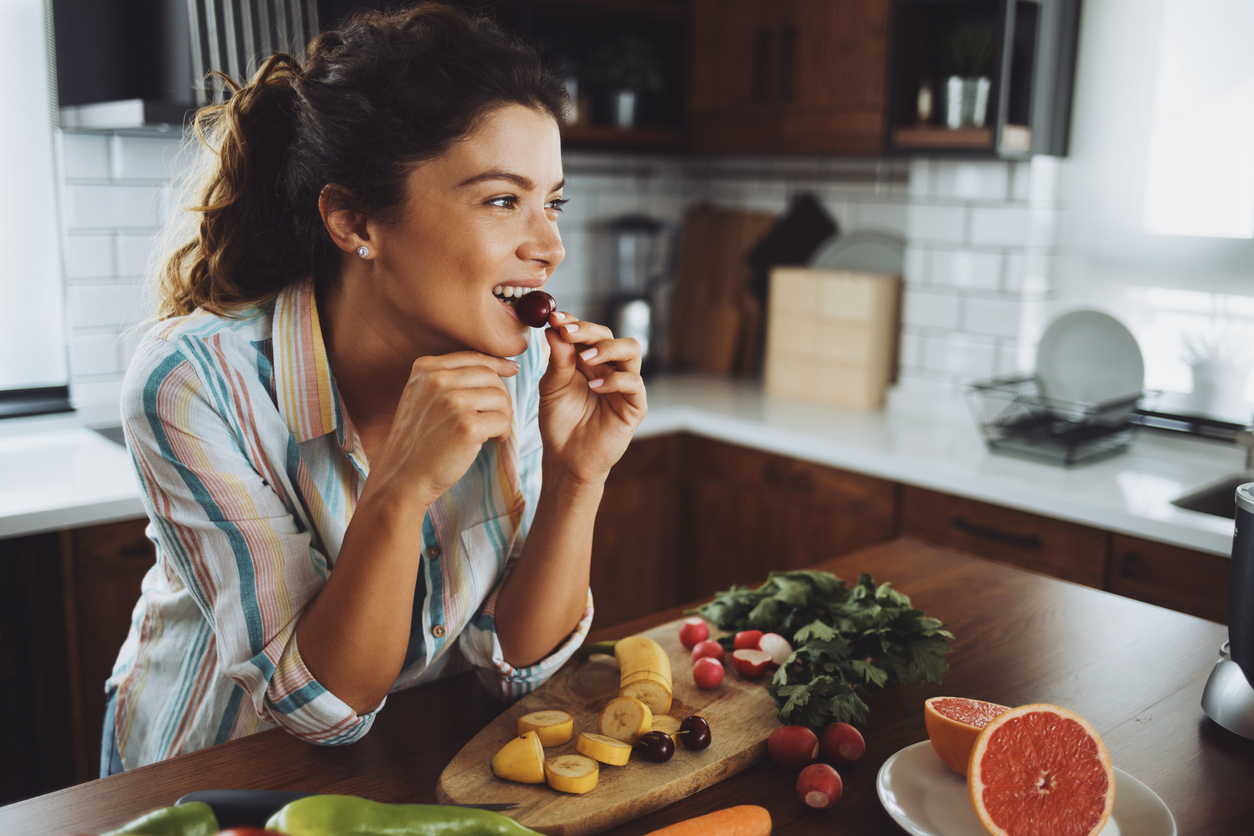The Relationship Between Sleep and Nutrition

Diet, like sleep, is one of the pillars of health and wellness—and they’re directly intertwined. Although a proper, balanced diet is essential for optimal health, poor sleep over time can undo many of the benefits of a healthy diet. It’s one of the reasons experts believe sleep is the single most effective pillar at resetting and restoring the brain and body. You may even be able to strategically harness the power of certain foods to improve sleep. On the other hand, preliminary research shows that certain foods and drinks—and the timing of their consumption—can wreak havoc on your sleep.
By understanding how sleep and nutrition are closely linked, you can optimize your diet—both by what and when you eat—to sleep better and live healthier lives.
The Effects of Specific Food Types on Sleep
It’s important to remember that a balanced diet including meals not consumed too close to bedtime will likely be sufficient for maintaining healthy sleep and overall health for most people. However, recent research suggests that certain whole foods may actually improve sleep for some people.
Avocados: A 2025 study involving 969 American adults found that eating one avocado a day over six months significantly improved sleep quality and duration. Avocados are rich in tryptophan, folate, and magnesium—nutrients that help regulate serotonin and melatonin levels, both critical for sleep-wake cycles (The Sun, 2025).
Tart Cherries: Studies on Jerte Picota cherries—a special variety native to Spain’s Jerte Valley—showed middle-aged and elderly adults experienced improved sleep onset and duration. Montmorency tart cherry juice has also been shown to increase total sleep time, reduce daytime napping, and boost melatonin levels (Sleep Foundation, 2024).
Kiwifruit: Participants who ate two kiwifruits an hour before bedtime for four weeks saw notable improvements in sleep efficiency and total sleep time. Kiwis are rich in melatonin, serotonin, and antioxidants thought to support healthy circadian rhythms (Sleep Foundation, 2024).
Oysters: Surprisingly, oysters may also support better sleep. A recent randomized controlled trial showed that their high zinc content and pairing with astaxanthin-containing krill improved both sleep quality and the time it took to fall asleep (Sleep Foundation, 2024).
High-Protein and Fiber-Rich Foods: A new 2025 analysis showed diets rich in fiber and protein—such as lean meats, nuts, legumes, vegetables, and whole grains—are positively associated with longer sleep duration and improved sleep efficiency (ScienceAlert, 2025).
While more research is needed, these early findings suggest that sleep-friendly foods may offer natural ways to support rest and overall well-being.
What About Timing?
Most experts agree that eating large or heavy meals close to bedtime can interfere with sleep. Digestion requires energy, which can delay the body’s natural process of winding down. Consuming saturated fats and sugary foods late in the evening can reduce the amount of deep sleep you get and trigger more nighttime wakefulness (Sleep Foundation, 2024).
If you must eat before bed, keep it small and light. Spicy foods—such as hot sauces and peppers—can raise body temperature and irritate your stomach, both of which may disrupt sleep.
How Alcohol Can Disrupt Sleep
If you’re having trouble falling asleep, you might reach for an evening drink. In fact, around 20% of Americans use alcohol to fall asleep (Sleep Foundation, 2024). But while alcohol can induce drowsiness, it typically disrupts sleep in the second half of the night as its sedative effect wears off.
Alcohol: A Potent REM Sleep Suppressor
Alcohol is one of the most powerful suppressors of REM sleep—the critical stage where dreaming and memory processing occur. As the liver metabolizes alcohol, your sleep becomes more fragmented. You may also experience frequent awakenings, lighter sleep, and multiple bathroom visits.
Even modest drinking can impair sleep:
- Low consumption (<2 servings): ~10% drop in sleep quality
- Moderate consumption (2 servings): ~25% drop
Alcohol and Sleep Disorders
Excessive alcohol use can worsen insomnia and increase the risk of sleep disorders like obstructive sleep apnea (OSA). One study found that people who binged more than two days per week had 64% higher odds of insomnia. Among young adults who binge drink weekly, 56% reported trouble staying asleep, and over 60% experienced snoring or symptoms related to OSA (Sleep Foundation, 2024).
The takeaway? While alcohol might make you feel sleepy, it’s likely to cause fragmented sleep and next-day fatigue.
Summer’s Impact on Sleep and Diet
As temperatures rise in the summer, sleep often suffers. Hotter nights can make it harder for the body to cool down, disrupting deep and REM sleep stages. Experts suggest keeping bedroom temperatures between 66–68°F for better rest. Using breathable sheets, blackout curtains, and cooling fans can help regulate temperature and light (Health.com, 2024).
Summer diets tend to shift too. Lighter meals rich in water-heavy foods like fruits and vegetables can support hydration and digestion, promoting smoother sleep. Meanwhile, avoiding heavy, spicy, or fatty foods before bed becomes even more important during warmer months (Sleep Foundation, 2024).
How SleepScore Can Help
At SleepScore Labs, we believe better sleep begins with better insights. The free SleepScore App uses advanced sonar technology to track your sleep—no wearables required. It offers detailed sleep scores and personalized tips to improve rest based on your lifestyle and habits, including your diet. Whether you’re looking to balance nutrition for deeper sleep, adjust your meal timing, or cope with hot summer nights, SleepScore delivers data-backed guidance to help you rest better.
Sleep well!
Sources